22 Surprising Signs You Have a Vitamin Deficiency

Despite having some of the best access to healthy food in the world, nutrition deficiencies are alarmingly common in the U.S. In fact, research published in the journal Nutrients in 2020 found that “45% of the U.S. population had a prevalence of inadequacy for vitamin A, 46% for vitamin C, 95% for vitamin D, 84% for vitamin E, and 15% for zinc.” But, aside from getting your levels checked annually at the doctor’s office, it can be difficult to know if you fall into one, or several, of these groups. That’s why we consulted doctors and nutritionists to find out the surprising signs you have a vitamin deficiency. Keep reading for their best advice.
Jump Ahead:
- Vitamin A Deficiency Symptoms
- Vitamin B Deficiency Symptoms
- Vitamin C Deficiency Symptoms
- Vitamin D Deficiency Symptoms
- Vitamin E Deficiency Symptoms
- Vitamin K Deficiency Symptoms
Vitamin A Deficiency Symptoms
“Vitamin A is important for normal vision, the immune system, reproduction, and growth and development,” according to the National Institutes of Health (NIH). “Vitamin A also helps your heart, lungs, and other organs work properly.”
The NIH notes that vitamin A deficiency is rare in the U.S., as most people get enough through the foods they eat, such as salmon, leafy green vegetables, eggs, dairy products, and fortified breakfast cereals.
However, it is still possible to be lacking in this nutrient, especially if you have cystic fibrosis, Crohn’s disease, ulcerative colitis, or celiac disease. Here are the signs you might not be getting enough vitamin A.
RELATED: 7 Surprising Benefits of Taking Magnesium Every Day.
2
Dry eyes
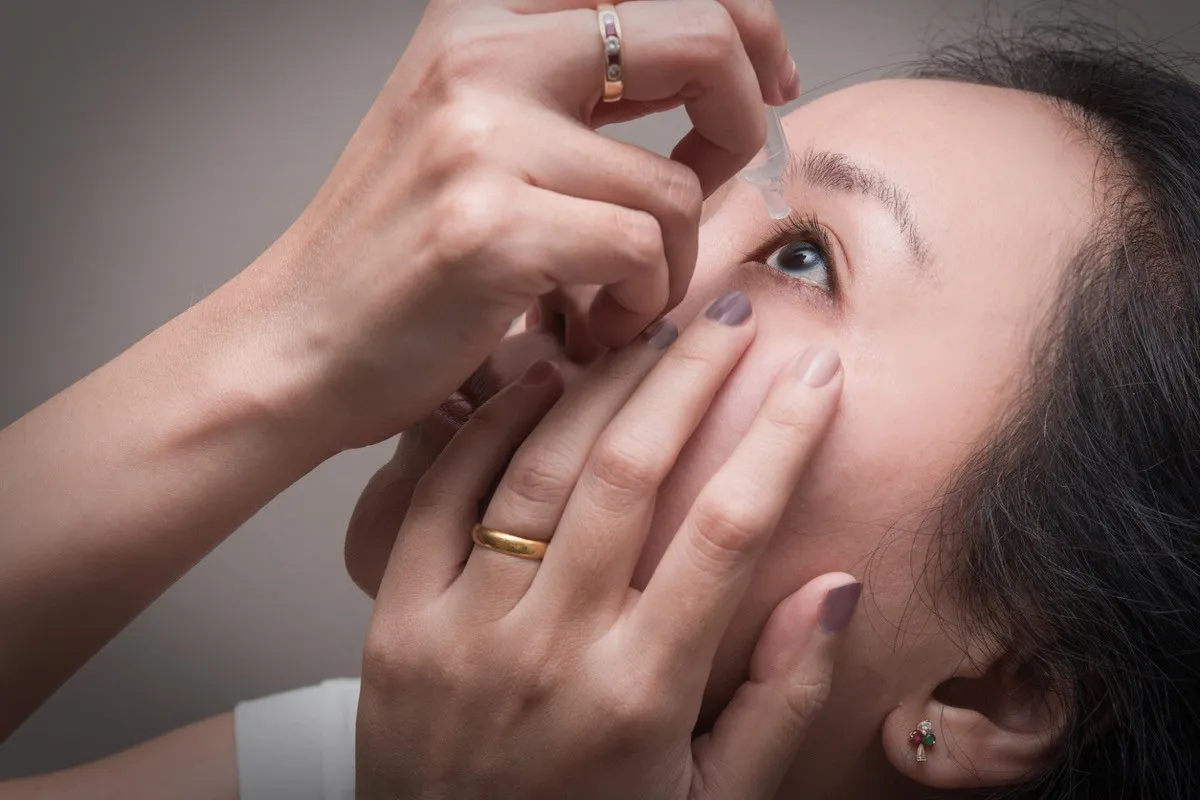
Vitamin A deficiencies often manifest in the eyes, which makes sense since beta carotene—a precursor to vitamin A—is often recommended for optimal eye health.
“Vitamin A is crucial for eye health,” notes functional medicine physician Yeral Patel, MD, who notes that “vitamin A deficiency is often found in those who suffer from dry eye.”
One 2013 paper published in the Community Eye Health Journal similarly notes that severe vitamin A deficiency often presents as dryness of the conjunctiva, otherwise known as xerophthalmia.
3
Night blindness

“Difficulty seeing in low light or experiencing night blindness may indicate a deficiency in vitamin A,” says Vadim Fedotov, CEO and founder of supplement company Bioniq.
According to the World Health Organization (WHO), vitamin A deficiency is the leading cause of preventable blindness among adolescents, particularly in developing countries. They estimate that up to 500,000 vitamin A-deficient children lose their sight annually.
And it’s not just youth who are at risk. The organization also notes that pregnant women, particularly those without access to health care, are equally vulnerable to this deficiency in the third trimester.
4
Anemia

If you get diagnosed with anemia—or a red blood cell deficiency—and you’re not sure what the root cause is, you should consider getting your vitamin A levels checked. The NIH Office of Dietary Supplements notes that “people with vitamin A deficiency… tend to have low iron status, which can lead to anemia.”
If you discover that a deficiency is the cause of your anemia, one 2013 meta-analysis published in the journal Nutrients concluded that vitamin A supplements can both prevent iron deficiency anemia and reverse it.
RELATED: 7 Supplements That Actually Keep You From Getting Sick.
Vitamin B Deficiency Symptoms
Vitamin B is perhaps the broadest category of vitamin. According to the Harvard T.H. Chan School of Public Health, there are 8 different B vitamins, which “help a variety of enzymes do their jobs, ranging from releasing energy from carbohydrates and fat to breaking down amino acids and transporting oxygen and energy-containing nutrients around the body.” Here are some surprising signs you may be lacking in one of them.
6
Mouth ulcers

According to nutritionist Lisa Richards, author of The Candida Diet, an interesting sign of B12 deficiency is mouth ulcers.
The vitamin B-mouth ulcer connection was proven in 2009 when physicians at Ben-Gurion University of the Negev gave subjects a nightly dose of vitamin B12 and found that it prevented canker sores.
Similarly, you might notice a sore or red/glossy tongue if you don’t have adequate B12, says Yelena Wheeler, MPH, a registered dietitian nutritionist at the National Coalition on Health Care (NCHC).
Wheeler notes that those on a vegan diet may be more susceptible to vitamin B12 deficiencies, as this nutrient is commonly found in “animal sources such as liver, beef, tuna, and clams.”
7
Dizziness

According to Richards, many patients with a B12 deficiency also experience dizziness. That’s because, as with vitamin A, having a vitamin B deficiency can lead to anemia, which reduces the number of healthy red blood cells in the body and disrupts the flow of oxygen to the brain.
8
Weak hair and nails

Another way anemia brought on by a vitamin B12 deficiency can manifest in your body is through brittle nails due to a lack of oxygen, Best Life previously reported.
Likewise, a lack of B12 can cause your hair to become weak or fall out, which can become especially common for women going through menopause.
“Vitamin B12 supplements help to produce oxygen-rich red blood cells, which transport oxygen to your hair follicles,” Don Grant, MD, clinical lead at online pharmacy The Independent Pharmacy, formerly explained to Best Life. “It is a biological process that promotes hair growth by producing new hair cells.”
9
Skin inflammation
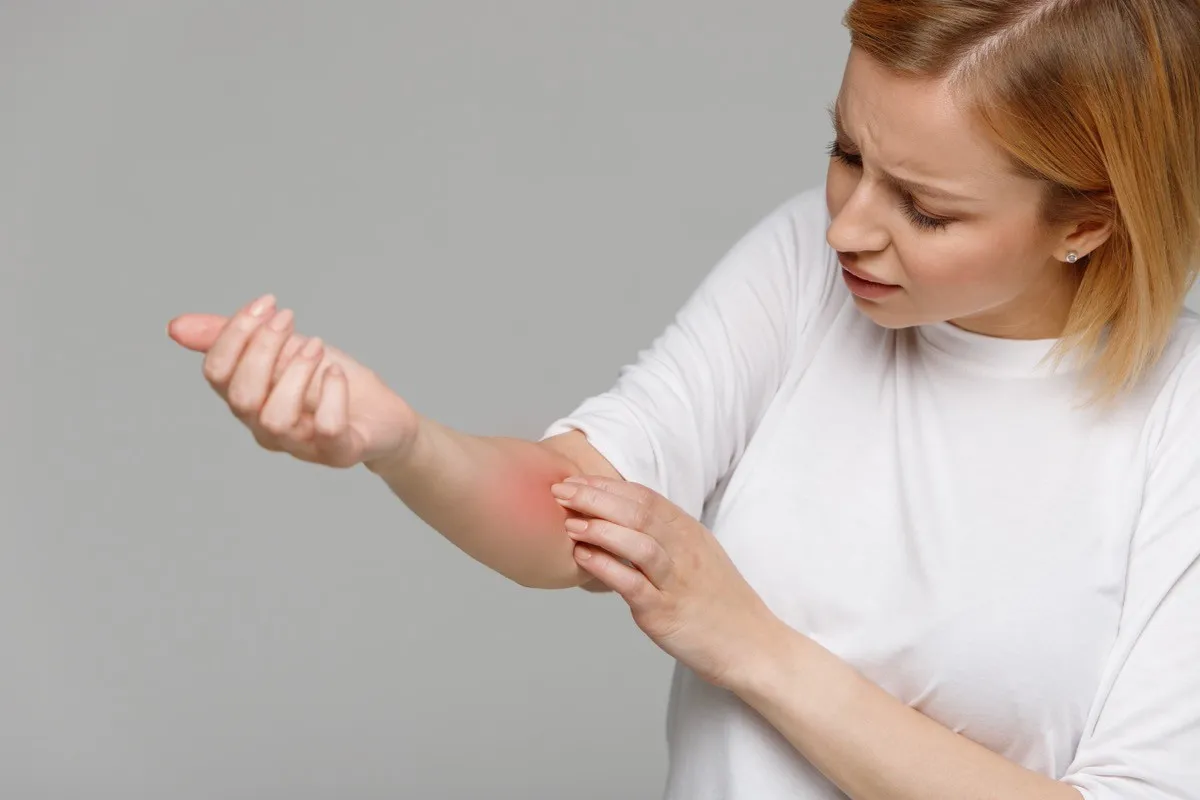
It’s not only vitamin B12 you need to stay on top of: A lack of B6, also known as riboflavin, can manifest in surprising ways, too.
“Dermatitis (inflammation of the skin) as well as red rashes, and the feeling of pins and needles on the extremities can be signs of a vitamin B6 deficiency,” explains Wheeler. “Vitamin B6 is found in beans, salmon, sunflower seeds, and bell peppers.”
If you are on an extreme diet or have a digestive issue like celiac disease, then pay extra close attention to this subtle symptom.
RELATED: I’m a Pharmacist, and These Are the Supplements I Won’t Take.
Vitamin C Deficiency Symptoms
You probably know that vitamin C aids your immune system, but do you know how?
According to the Mayo Clinic, “Vitamin C is an antioxidant that helps protect your cells against the effects of free radicals—molecules produced when your body breaks down food or is exposed to tobacco smoke and radiation from the sun, X-rays or other sources.”
They add that it’s essential to your body forming “blood vessels, cartilage, muscle and collagen in bones,” as well as the absorption and storage of iron.
However, your body doesn’t naturally produce vitamin C, so it’s essential to get this nutrient from your diet. It’s found in citrus fruits, of course, but also in berries, tomatoes, broccoli, and spinach. These are some surprising clues you’re not getting enough.
11
Wrinkles

“Too little vitamin C will increase signs of aging such as wrinkles,” explains certified nutritionist Ann Ramark. That’s because vitamin C regulates the production of collagen, the protein responsible for your skin’s elasticity and youthfulness, she explains.
So what can you do if your vitamin C levels are low? Ramark says that “just by increasing your intake of fruits and vegetables, you could see a dramatic effect on your skin.”
12
Broken blood vessels on the skin
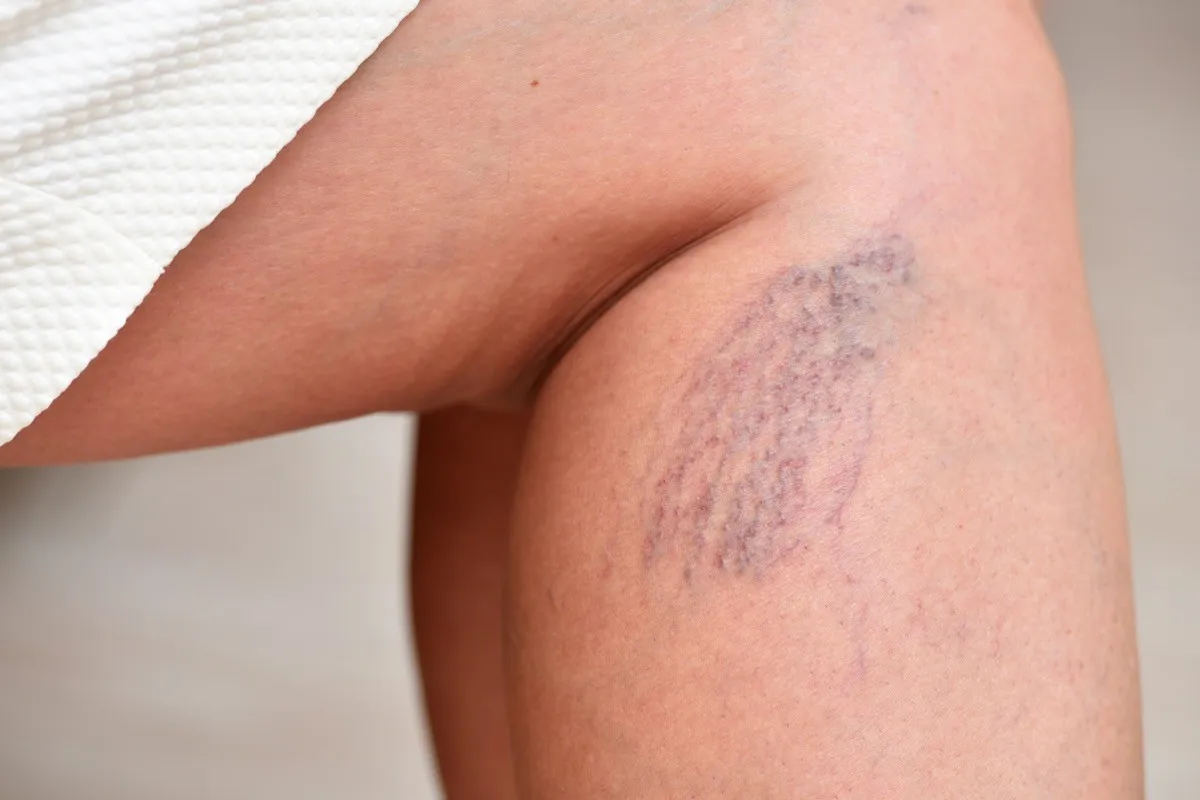
A vitamin C deficiency doesn’t just impact your skin by making wrinkles more visible. According to physician Greg Burrell, co-founder of Carbon Health, this issue can also lead to “broken blood vessels on the skin.”
If you think you have a vitamin C deficiency causing skin issues, there is hope. When treated, “symptoms resolve fairly quickly,” Burrell says. “The severe symptoms can resolve within a day or two, [and] the others within a few weeks.”
13
Swollen gums
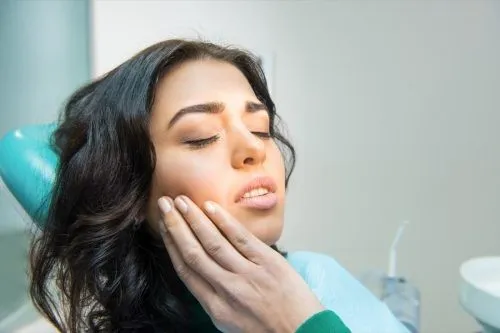
According to dentist Daniel Balaze of Balaze & Gregg Dentistry, a vitamin C deficiency often manifests in the mouth “in the form of red, swollen, and irritated gums.”
Kim Shapira, MS, RD, a celebrity dietitian and nutritional therapist, adds that you may even find that your gums are bleeding.
If your gums feel especially sensitive and you aren’t sure why, talk to your primary care provider about the possibility of a vitamin C deficiency.
14
Cuts that don’t heal
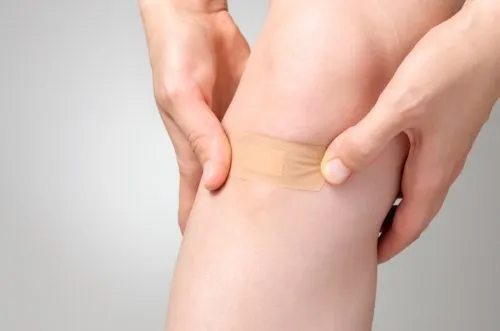
For the same reason that your gums may bleed, you may also find that any cuts on your skin take longer to heal if you have a vitamin C deficiency.
“Vitamin C promotes your body’s natural healing mechanisms for cuts, bruises, and infections, which is why it’s often recommended to up your vitamin C content if you’re unwell,” explains Hussain Ahmad, MUDr/MD, a consultant practitioner at Click2Pharmacy.
RELATED: 7 Supplements That Actually Help You Wake Up in the Morning.
Vitamin D Deficiency Symptoms
“Vitamin D builds strong bones by helping the body absorb calcium. This helps protect older adults from osteoporosis,” explains the CDC. It’s also essential for muscle and nerve function, and it aids the immune system in resisting bacteria and viruses.
It’s well known that some vitamin D comes from sun exposure, but as the NIH shares, it can also be found in fortified milk and breakfast cereals, as well as fatty fish like salmon tuna, and fish liver oils.
Vitamin D deficiency is especially common. In fact, a 2011 study published in the journal Nutrition Research found that 42 percent of adults in the U.S. are vitamin D deficient. A similar study published in 2022 in Frontiers in Nutrition concluded that vitamin D deficiency is more prevalent among “non-Hispanic black Americans, women, individuals aged 20–29, and during winter.” Here are some signs you might need more of this nutrient.
16
Muscle cramps

In addition to strengthening our bones, vitamin D also affects our muscles. A lack of this nutrient can result in decreased muscle mass, in turn leading to cramps.
“This is because vitamin D regulates calcium homeostasis, which is necessary for proper muscle contraction and relaxation,” Denise Pate, MD, a board-certified physician and Medical Director with Medical Offices of Manhattan, previously explained to Best Life.
17
Sleep issues

“A deficiency in vitamin D has been associated with many changes in sleep such as fewer sleeping hours and sleep that is less restful and restorative,” says Burrell. “It has also been linked with increased inflammation of the nose and tonsils, which can lead to sleep apnea and disturbed sleep.”
A 2018 meta-analysis of nine studies published in the journal Nutrients concluded that people with a vitamin D deficiency have a 50 percent increased risk of sleep disorders.
18
Hair loss

“One surprising sign of a vitamin D deficiency is hair loss,” says Richards.
That’s because, as a 2019 study published in Dermatology and Therapy explains, this nutrient is involved in the synthesis of keratin, the protein that makes up hair.
19
Mood changes

In addition to physical health, vitamin D also plays a role in mental health.
“Something you may notice is a change in your overall mood—feeling down and tired, or even experiencing signs of depression,” notes nutritionist Robert Thomas, co-founder of men’s health website Sextopedia.
The link between your mood and your vitamin D levels exists thanks to serotonin, the so-called happiness hormone. As one 2015 study published in The FASEB Journal notes, vitamin D helps maintain adequate serotonin levels in the brain.
20
Slow-healing wounds

Similar to a vitamin C deficiency, if you find that it’s taking your body a long time to heal wounds and other skin injuries, that could be another surprising symptom of vitamin D deficiency.
“Vitamin D is involved in many body processes, and when your body is injured, higher amounts of this vitamin are needed for proper recovery,” says Thomas. “Vitamin D affects and regulates cell growth—so therefore, sufficient levels of the vitamin are crucial for forming new skin.”
RELATED: 10 Effective Ways to Motivate Yourself to Eat Healthier.
Vitamin E Deficiency Symptoms
“Vitamin E is a nutrient that’s important to vision, reproduction, and the health of your blood, brain and skin,” according to the Mayo Clinic. “Vitamin E also has antioxidant properties.”
They note that the foods richest in vitamin E are canola oil, olive oil, margarine, almonds, and peanuts. Certain meats, dairy, and leafy greens also contain the nutrient. If you aren’t getting enough, you may notice these signs.
22
Difficulty balancing

Though vitamin E deficiencies are uncommon, they are sometimes seen in people with cystic fibrosis or celiac disease, says Kristine Arthur, MD, an internist at MemorialCare Medical Group in California. And if you’re worried you might have one, she says a common symptom to watch out for is “balance problems.”
In short: If you’re falling more frequently and you know you are at risk for vitamin E deficiency, it may be time to get your levels checked.
23
Nerve pain

Nerve pain, which the Cleveland Clinic describes as feeling “more like burning, stabbing, or shooting pain,” can be caused by a vitamin E deficiency.
A pivotal 1999 case study published in the journal Archives of Physical Medicine and Rehabilitation describes a vitamin E-deficient patient who, after nine months of being treated with vitamin E, was able to overcome his nerve pain and reduced motor function.
24
Muscle pain

Vitamin E plays a huge role in the maintenance of your muscles. One 2013 study published in the International Journal of Preventive Medicine found that subjects who took 400 IU daily of vitamin E saw reduced muscle damage.
Of course, feeling sore after a workout isn’t a cause for concern, but if your muscles are weak and achy, and you’re relatively inactive, take note.
RELATED: 10 Surprising Benefits of Taking Fish Oil Every Day.
Vitamin K Deficiency Symptoms
“Vitamin K is a fat-soluble vitamin which comes from sources such as green leafy vegetables, soybeans, and canola oils,” shares Wheeler.
The main functions of this nutrient, notes the NIH, are to help your blood clot and your bones stay healthy.
26
Clotting issues

Vitamin K “is needed for the creation of a protein that assists with bleeding control,” says Wheeler. Without it, your blood will take longer to clot.
People with absorption issues like cystic fibrosis, celiac disease, ulcerative colitis, and short bowel syndrome should pay extra close attention to how they clot, as they are at an increased risk of vitamin K deficiency.
27
Frequent bruising

Arthur says that “easy bruising” is one of the surprising signs of a vitamin K deficiency, due to the blood not clotting as quickly.
28
Nosebleeds

Due to its importance in clotting of the blood, if you’re low in vitamin K, you may have a greater risk of bleeding and nosebleeds.
For more wellness advice delivered straight to your inbox, sign up for our daily newsletter.
- Source: https://www.ncbi.nlm.nih.gov/pmc/articles/PMC7352522/
- Source: https://www.ncbi.nlm.nih.gov/pmc/articles/PMC3936686/
- Source: https://www.who.int/nutrition/topics/vad/en/
- Source: https://ods.od.nih.gov/factsheets/VitaminA-HealthProfessional/
- Source: https://www.ncbi.nlm.nih.gov/pmc/articles/PMC3916855/
- Source: https://www.jabfm.org/content/22/1/9
- Source: https://www.ncbi.nlm.nih.gov/pmc/articles/PMC6213953/
- Source: https://www.ncbi.nlm.nih.gov/pmc/articles/PMC6380979/
- Source: https://www.fasebj.org/doi/abs/10.1096/fj.14-268342?journalCode=fasebj